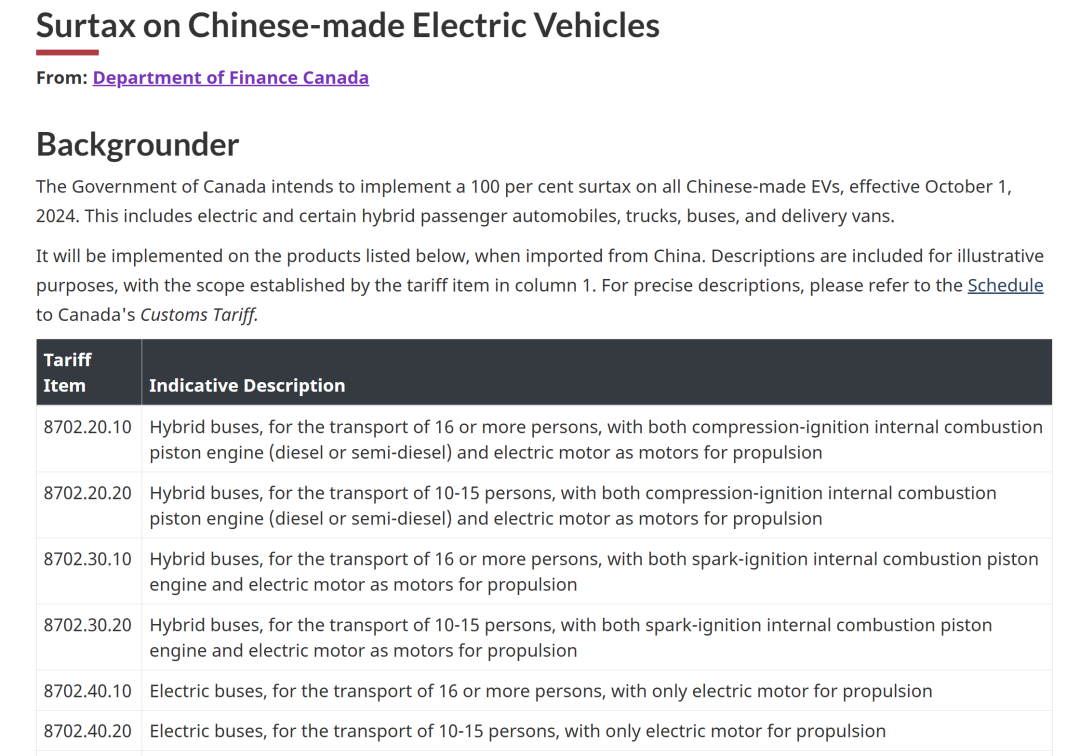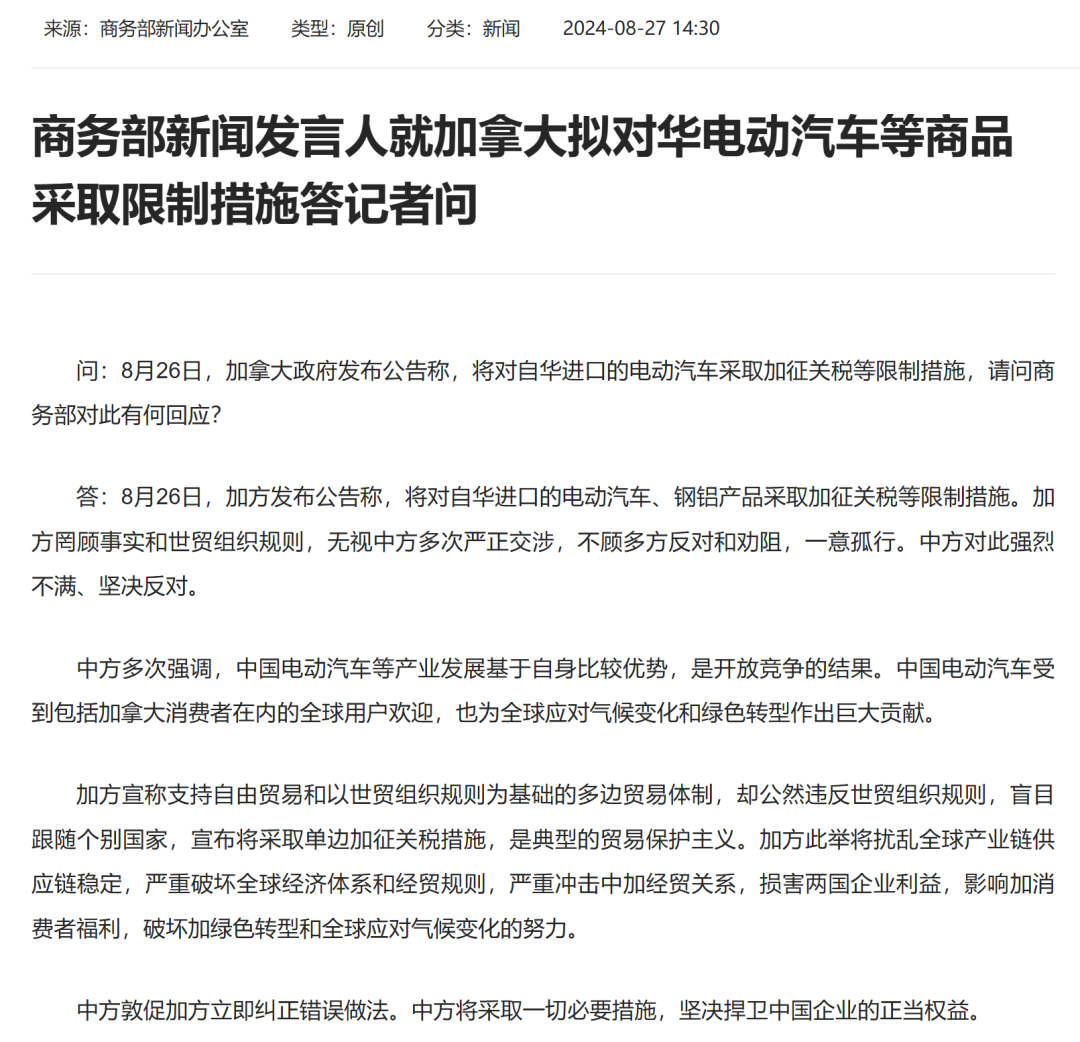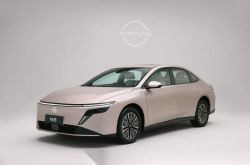Canada follows suit in imposing tariffs on Chinese electric vehicles, more provocative than substantial harm
![]() 08/30 2024
08/30 2024
![]() 435
435
Canada's disregard for WTO rules and imposition of a 100% tariff on Chinese electric vehicles will disrupt normal economic and trade cooperation between China and Canada, harm the interests of Canadian consumers and businesses, hinder Canada's green transformation and global efforts to combat climate change, and ultimately lead to low-level development of its own industries, harming both itself and others.
Following Europe and the United States, Canada has also taken action. On August 26th, local time, Canadian Prime Minister Trudeau announced that Canada would impose a 100% tariff on electric vehicles imported from China and a 25% tariff on steel and aluminum imported from China, which are comparable to US tariffs on China. In response, the spokesperson for the Chinese Embassy in Canada immediately stated: "Canada's move is a typical act of trade protectionism and political dominance, disregarding WTO rules and inconsistent with Canada's self-proclaimed position as an advocate of global free trade and climate change mitigation. This move will disrupt normal economic and trade cooperation between China and Canada, harm the interests of Canadian consumers and businesses, hinder Canada's green transformation and global efforts to combat climate change, and is completely detrimental to others without benefiting oneself."

"It should be said that Canada's imposition of tariffs this time is not an isolated action," said Wei Wenqing, Executive Deputy Secretary-General of the China Association of Automobile Manufacturers in an interview. Currently, the global economy is under increasing downward pressure, and geopolitical conflicts are increasing, so international trade protectionism led by the United States is on the rise. Canada's choice to follow the United States and impose tariffs on Chinese electric vehicles without conducting any investigations or having solid evidence is a violation of international trade rules and will ultimately lead to insufficient competition and low-level development in its own industries, harming both itself and others.
Canada disregards WTO rules and distorts facts
It is reported that the new tariff policy will take effect on October 1st and apply to electric vehicles from China, including passenger cars, trucks, buses, and vans. Tariffs on steel and aluminum will take effect in two weeks. "Countries like China choose to give themselves an unfair advantage in the global market," Trudeau claimed at a cabinet meeting regarding the tariffs on Chinese electric vehicles and steel and aluminum products, blaming China for "not following the same rules."
Chrystia Freeland, Canada's Deputy Prime Minister and Minister of Finance, stated that Canada would also initiate 30-day consultations on possible tariffs on Chinese batteries, battery components, semiconductors, critical minerals, metals, and solar panels.
Foreign media quoted Guy Saint-Jacques, Canada's former ambassador to China, as saying, "Given Canada's economic integration with the United States and the fact that over 75% of its exports go to the United States, Canada has no choice but to take the American side." Saint-Jacques believes that Canada may face countermeasures from China in other industries.
China immediately expressed strong dissatisfaction and firm opposition to Canada's unilateral decision to impose tariffs on Chinese electric vehicles. The spokesperson for the Chinese Embassy in Canada pointed out that the rapid development of Chinese electric vehicles relies on continuous technological innovation, a comprehensive production and supply chain system, and full market competition, resulting from the combined effects of comparative advantages and market laws, rather than relying on subsidies to gain a competitive edge. Canada's accusation of so-called "overcapacity" in China is unfounded. China urges Canada to respect the facts, abide by WTO rules, immediately correct its wrongdoings, and avoid politicizing economic and trade issues. China will take all necessary measures to safeguard the legitimate rights and interests of Chinese enterprises.
The spokesperson for the Ministry of Commerce also responded on August 27th, expressing strong dissatisfaction and firm opposition to Canada's disregard for facts and WTO rules, ignoring China's repeated solemn representations, and ignoring opposition and dissuasion from various parties. China urges Canada to immediately correct its wrongdoings and will take all necessary measures to resolutely defend the legitimate rights and interests of Chinese enterprises.

Adding Fuel to the Fire of Global Automobile Decoupling
As one commentator put it, "Considering Canada's population size and economic scale, this move by the Canadian government can only be described as 'not very harmful, but highly provocative.'"
It is understood that Chinese automobiles currently enter the Canadian market mainly through parallel imports, with relatively low sales volumes. According to customs export data, China exported only 14,000 automobiles to Canada from January to April 2024, with Tesla accounting for up to 60% of the total. Some analysts believe that American and Japanese cars dominate the Canadian market, and Chinese independent brands have not yet officially entered, so "imposing tariffs has a relatively small impact on independent brands."
Wei Wenqing pointed out that Canada's imposition of a 100% tariff on electric vehicles imported from China will first harm domestic consumers, depriving them of access to high-quality and low-cost products from other countries. Secondly, it will block exchanges and cooperation between the automotive industries of China and Canada, preventing the creation of a market environment conducive to fair competition and industrial transformation and upgrading. Thirdly, this move will escalate trade frictions between countries, further destabilizing the global automotive supply chain. "In fact, exchanges between China and North American automotive industries have never ceased, and there is a genuine demand for cooperation and exchange between the North American automotive industry and China," Wei Wenqing admitted. Canada's typical act of trade protectionism and political dominance will delay the trend of trade and investment cooperation between the two sides in the future. Additionally, it is worth emphasizing that the development of China's electric vehicle industry has made a positive contribution to the global fight against climate change and the transition to green energy. However, Canada's rejection of Chinese electric vehicles with such high tariffs will also hinder North America's progress towards carbon neutrality goals.
Wei Wenqing believes that although the impact of Canada's tariff increase on China's automobile exports appears limited from a trade volume perspective, it has further deteriorated the Sino-Canadian trade relationship, which was already heading towards recovery, and has added fuel to the fire of global automobile decoupling.
Strengthening Communication and Creating a Favorable Market Environment
On May 14th, the United States announced a sharp increase in tariffs on Chinese electric vehicles from 25% to 100%, and tariffs on lithium-ion electric vehicle batteries and other battery components from 7.5% to 25%. On August 20th, the European Commission disclosed a draft decision to impose final countervailing duties on pure electric vehicles imported from China, with minor adjustments to the proposed tariff rates, including 17% for BYD, 19.3% for Geely, 36.3% for SAIC Motor, 21.3% for other cooperative companies, and 36.3% for all other non-cooperative companies.
It can be seen that the Chinese automotive industry, which is at a critical juncture of internationalization, is facing pressure from some countries and regions. So, how should the Chinese automotive industry respond to these new challenges on its path to internationalization under the new situation?
Wei Wenqing proposed three suggestions. First, both Chinese and foreign parties must strengthen exchanges and cooperation. Not only in overseas markets but also in the domestic market, Chinese and foreign automakers should enhance understanding and communication. Additionally, China should strive to join the Comprehensive and Progressive Agreement for Trans-Pacific Partnership (CPTPP) as soon as possible and further negotiate higher levels of openness for the automotive industry within existing regional economic and trade agreements, such as the Regional Comprehensive Economic Partnership (RCEP). It is also essential to consider adding more bilateral and multilateral regional economic and trade agreements, such as the Digital Economy Partnership Agreement (DEPA), to create a more favorable environment for Chinese automobiles to go global.
Second, although the Chinese automotive industry has a large market size, the internationalization of Chinese automakers is still in its infancy, with few overseas manufacturing bases and most still relying on trade. Wei Wenqing believes that Chinese automakers need to strengthen and improve in areas such as technological capabilities, talent teams, strategic planning, and customer service, actively integrating into local markets. To this end, he suggests that the government, industry, associations, society, upstream supply chains, parallel testing and certification agencies, finance, marketing, and after-sales markets should collaborate and fulfill their respective responsibilities to jointly build world-class Chinese automotive multinational corporations.
Third, it is crucial to create a positive public opinion environment and avoid unnecessary fear on the part of counterparties due to exaggerated self-promotion that does not align with reality.
"Although trade protectionism has risen recently, and the international situation is severe, we should not be too pessimistic," said Wei Wenqing. Currently, it is individual politicians who are promoting trade protectionism, and he believes that the globalization of labor division and strengthened international cooperation will ultimately become the major trend in the development of the automotive industry. Perhaps after experiencing these "growing pains," the Chinese automotive industry will become stronger and truly achieve higher-quality development.
Image: From the Internet
Article: Auto Insights
Typesetting: Auto Insights







